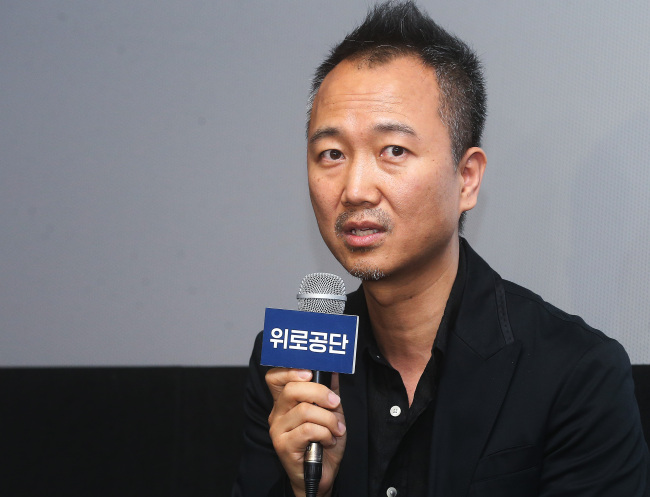Film director Im hopes to spur interest in working women
By Won Ho-jungPublished : May 14, 2015 - 18:53
Im Heung-soon, winner of the Silver Lion Award at this year’s Venice Biennale, hopes his work “Factory Complex” spurs interest in the lives of working women in Korea and around Asia.
“In the 60s, 70s, and 80s women worked physically demanding jobs. After the 80s, they became focused in service and emotional labor. I thought about what happened to all of those laborers, and realized that they were our mothers, our sisters, people around us,” said Im at a press conference held at the Art Nine theater in Dongjak-gu, Seoul, Thursday.
“Factory Complex” brought Korea the country’s first Silver Lion, the second-highest honor given at the annual art festival and the highest ever received by any Korean artist. The accomplishment was doubly significant for 46-year-old Im, as the festival generally honors artists under 35.
“In the 60s, 70s, and 80s women worked physically demanding jobs. After the 80s, they became focused in service and emotional labor. I thought about what happened to all of those laborers, and realized that they were our mothers, our sisters, people around us,” said Im at a press conference held at the Art Nine theater in Dongjak-gu, Seoul, Thursday.
“Factory Complex” brought Korea the country’s first Silver Lion, the second-highest honor given at the annual art festival and the highest ever received by any Korean artist. The accomplishment was doubly significant for 46-year-old Im, as the festival generally honors artists under 35.

In the 108-minute film, a montage of interviews intermingles with video art scenes. Interviews include those with women recollecting their experiences working in factories of the past, and women who are working today in call centers. The artistic scenes depict women often standing still, their eyes or faces covered by scarves.
The project originally began as a visual art work, but expanded to touch upon the medium of film, Im said. “I like to work at boundaries (between categories). I believe that allows for the expression of a more diverse array of perspectives on life.”
“When I did the interviews, it wasn’t just to gather information. The impressions of those interviews collected inside of me, and I reflected those impressions in my own way,” he said. “Covering the women’s faces and eyes was symbolic of the environment in which these women worked, in dusty factories where they had trouble breathing or even opening their eyes. It also symbolizes the anonymity of the women who worked to bring us where we are today.”
The film is set to open in local theaters in the latter half of the year.
Although Im admits that the experimental nature of the film may make it difficult for audiences to follow, he hopes that many young people will see the movie.
“Particularly young people seeking employment and women in their 30s and 40s. I believe they will be able to relate to the film the most.”
“We often forget about where the clothes and shoes we wear come from. I hope audiences will think about what the past was like, the essence of the work they do today, and how they want to live their lives in the future.”
By Won Ho-jung (hjwon@heraldcorp.com)







![[Hello India] Hyundai Motor vows to boost 'clean mobility' in India](http://res.heraldm.com/phpwas/restmb_idxmake.php?idx=644&simg=/content/image/2024/04/25/20240425050672_0.jpg&u=)










